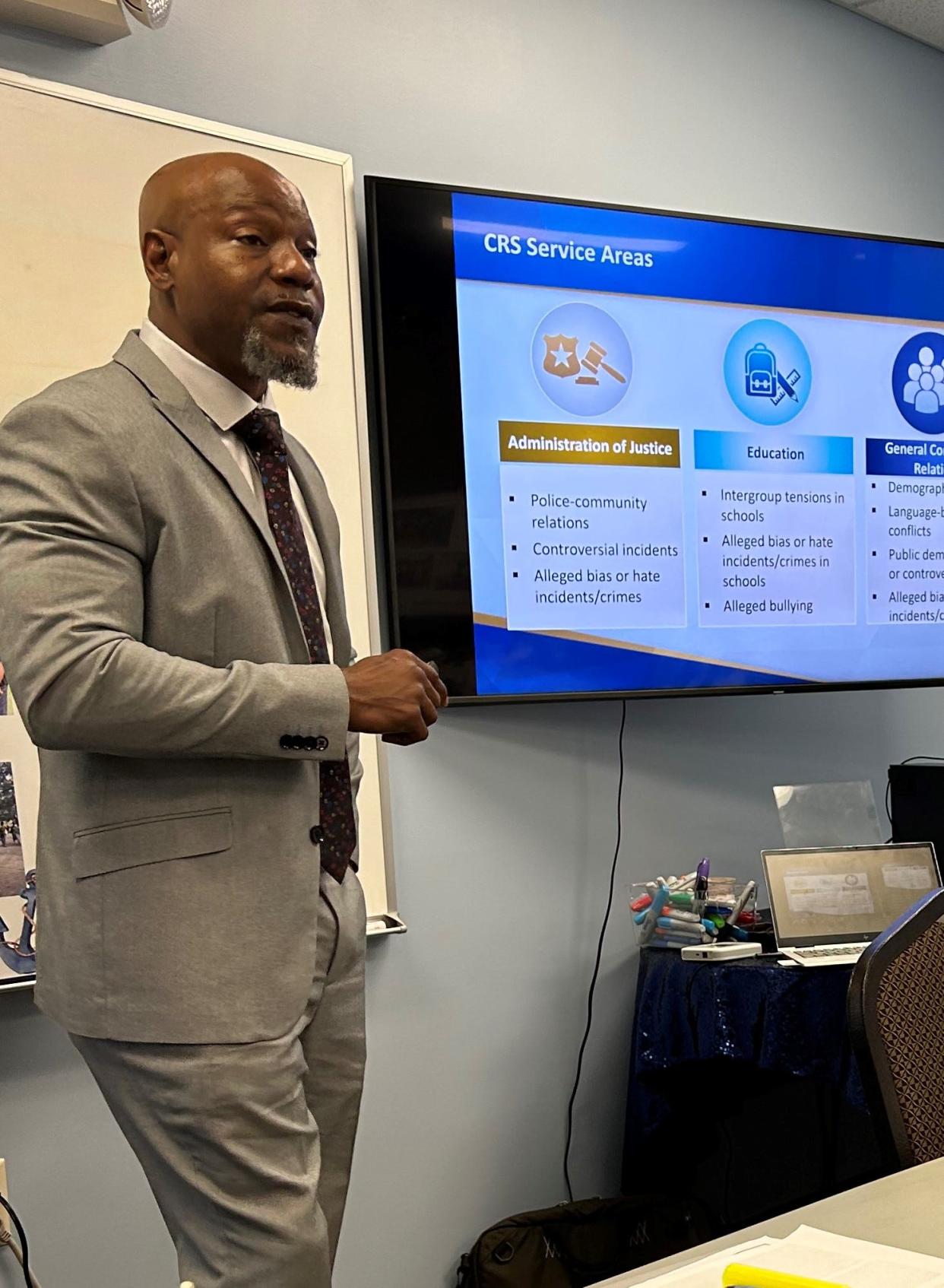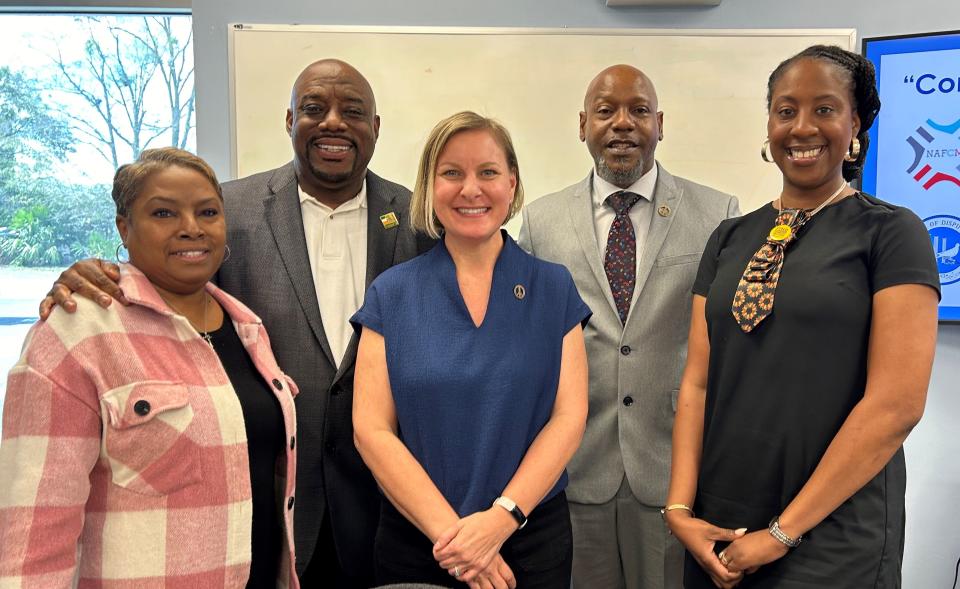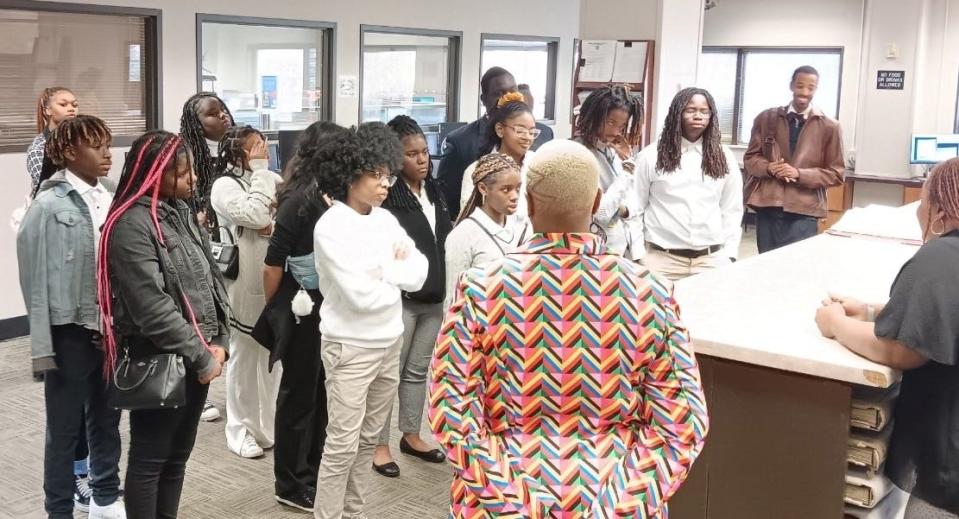US DOJ Community Relations Service official impressed by Savannah’s Mediation Center

- Oops!Something went wrong.Please try again later.
U.S. Department of Justice (DOJ) Conciliation Specialist Dion Lyons helped create the Community Coordination Center in Brunswick, Georgia, after the murder of Ahmaud Arbery. In the months following Arbery’s death, his family and Brunswick community members, outside civil rights organizations, and local law enforcement were at odds with one another. They were also not necessarily talking to each other.
That was where Lyons and the DOJ’s Community Relations Service (CRS) came in. CRS was started as part of Title X of the Civil Rights Act of 1964 under President Lyndon Johnson. CRS’s mission is to serves as "America's Peacemaker" for communities facing conflict based on actual or perceived race, color, national origin, gender, gender identity, sexual orientation, religion, or disability.” Lyons is based at CRS’s Atlanta office. That is how he wound up helping Brunswick’s various groups facilitate meetings and mediate difficult conversations that alleviated tension and arrived at solutions in the wake of Arbery’s murder.
Lyons, a former JAG officer and schoolteacher, counts the Arbery experience as one of the most meaningful of his professional life. He lamented, however, that much of CRS’s work entails reacting after harm has been done. He and the organization have a vision to drive more preventive efforts, which connected him with The Mediation Center of the Coastal Empire, a nonprofit organization on Paulsen Street in Savannah.
As Lyons learned more about the center, he reiterated that, “Triage is not the answer [to resolving conflict].” He wondered aloud if mediation centers such as Savannah’s might be the role model for more communities in need.

How Savannah's mediation center resolves conflicts
The Mediation Center was founded in 1986 and became a United Way agency in 2001. What started as a neighbor-to-neighbor conflict resolution resource has grown to be a hub for youth programs, training opportunities, professional services and the Family Law Resource Center. As a nonprofit, the center relies heavily on donations and grants. The center recently held its Anchored in the Community fundraiser (formerly known as the Velvet Gala) on Feb. 8. The event raised $50,000 for the center’s various programs.
Executive Director Jill Cardenas said, “We’re here to help the community become more conflict resilient.” The 501(c)3 also notes that it helps citizens “create alternatives to litigation and increase access to justice.” To do that, Cardenas said, a foundational tenant of all community mediation centers is “the people in the conflict are the best ones to help resolve and create the solutions of the conflict.”
She said that is why the work needs to be done locally and with diverse mediators so that they represent the community. “Our team is pretty diverse, but we still can't be as diverse as our community with a staff of 15 people,” she said. The organization states that it has trained more than 500 volunteer mediators, conducted 10,000+ mediations and facilitated more than 7,000 settlements.
As far as community impact goes, that was on display during Lyons’s presentation on March 6 at the center’s offices. Meeting attendees represented the Savannah-Chatham County Public School System (SCCPSS), Savannah Police Department (SPD), Chatham County Sheriff’s Office, Chatham Emergency Response and other nonprofits such as Resilient Coastal Georgia and United Way of the Coastal Empire. Savannah Mayor Van Johnson, District 4 City Councilman Nick Palumbo, and attorney Wade Herring (who is now on the center’s board) were also in attendance as was the center’s current board president Curtis Singleton.
The local involvement seemed to throw Lyons off his game as he was set to present on CRS’s Facilitating Meetings Around Community Conflict (FMACC). The mediation center already provides a good bit of what the FMACC may cover. Yet, all were curious how the federal CRS could further develop, train and grow Savannah's conflict resiliency. The plan at the end of the meeting was for attendees to identify 30-55 community members that would want to take the FMACC training.

Youth programs to watch
A key to conflict-resilient communities is youth involvement. Some young people experience the center through Restorative Youth Court as volunteers who “serve as the lawyers, judge, and jury in sentencing hearings for youth who have been charged with misdemeanor offenses. The court practices restorative justice to promote behavioral change and reduce recidivism.”
Sherlisa Praylo, the Mediation Center’s director of restorative practices & community outreach, said, “The kids take it super serious. These are not mock trials.” The offenses that student volunteers are tasked with adjudicating are dress code violations, improper cell phone usage, excessive absences.
“What we're trying to do is an alternative to out-of-school and in-school suspensions,” said Praylo. “It’s you being accountable not only for yourself as a student but accountable for your peers, in a community.”
The Youth Court began in October of 2022 with support from the J.W. Fanning Institute for Leadership Development at the University of Georgia. The center piloted the court at four SCCPSS high schools: Johnson, Jenkins, Early College and School of Liberal Arts at Savannah High. “Savannah High has a real-life courtroom that looks just like the courtroom downtown,” said Praylo. The program expanded this year to include Mercer Middle School. The court meets once a week alternating between Tuesdays and Wednesdays to accommodate different students’ schedules. The court hears two cases per week with proceedings starting at 4:30 and 5:30 p.m.
The youth court is just one of the many youth programs that the center offers. Others include Ambassadors for Peace, Peer Mediation and Peace Between Peers. A newer initiative that began last year is called Positive Peer Influencers, which trains high school students to mentor middle school students. High school student model behavior and talk about a wide range of issues such as peer pressure.
“Each of our youth programs does include an educational component,” Cardenas said. “Students learn the art of asking questions, positive skills about being curious, leading with integrity, keeping information confidential, listening and…about making positive decisions.”
Lyons seemed particularly interested in the center's youth programs because education is an area in which CRS aims to increase its influence.
Joseph Schwartzburt is the education and workforce development reporter for the Savannah Morning News. You can reach him at JSchwartzburt@gannett.com.
This article originally appeared on Savannah Morning News: US DOJ official impressed by Savannah's mediation center

